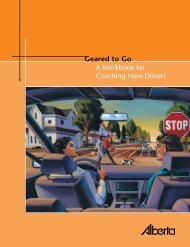Commercial driver's guide to operation, safety and licensing
Commercial driver's guide to operation, safety and licensing
Commercial driver's guide to operation, safety and licensing
You also want an ePaper? Increase the reach of your titles
YUMPU automatically turns print PDFs into web optimized ePapers that Google loves.
Of course, money isn’t the only<br />
consideration. The environment is a key<br />
fac<strong>to</strong>r, <strong>to</strong>o. Nearly 30% of all greenhouse<br />
gas emissions in Canada are produced<br />
by the road transportation sec<strong>to</strong>r, a<br />
significant portion of them from heavyduty<br />
vehicles. Fortunately, there are many<br />
practical decisions you can make as a<br />
driver <strong>to</strong> be more fuel-efficient - from<br />
vehicle specifications <strong>to</strong> behind-the-wheel<br />
techniques <strong>and</strong> behaviours.<br />
Making smart choices<br />
Your driving habits can reduce the amount<br />
of fuel you burn. Here are some tips you<br />
can take:<br />
Preparation <strong>and</strong> planning<br />
• Plan your route carefully: flat routes are<br />
more fuel efficient than mountainous<br />
routes; highway driving is more fuel<br />
efficient than “inner city” driving.<br />
• Carefully consider your vehicle<br />
specification options <strong>and</strong> always<br />
maximize your payload: instead of<br />
60% capacity, try <strong>to</strong> achieve 80<br />
or 90% capacity.<br />
• Read the owner’s manual for your<br />
vehicle <strong>and</strong> follow the manufacturer’s<br />
driving recommendations.<br />
Fuel <strong>and</strong> your engine<br />
• Using the proper grade <strong>and</strong> type of<br />
fuel can improve fuel economy by as<br />
much as 3%.<br />
• A direct drive transmission instead of an<br />
overdrive transmission may reduce fuel<br />
consumption by up <strong>to</strong> 2%.<br />
Vehicle choice <strong>and</strong><br />
accessories<br />
• Optimize trac<strong>to</strong>r aerodynamics:<br />
reducing aerodynamic drag by 10%<br />
can increase fuel efficiency by 5%.<br />
Consider using doubles or triples instead<br />
of single trailers where authorized.<br />
• Use rib design tires in all positions: it’s<br />
more fuel efficient than using lug tires on<br />
the drive <strong>and</strong> steering axle.<br />
• Consider using low rolling resistance<br />
tires. When looking at the specifications<br />
of a new truck, remember that super<br />
single tires provide low rolling resistance<br />
as well as lower height <strong>and</strong> less weight.<br />
• Choose lighter truck specifications<br />
where appropriate. Less vehicle<br />
weight means better fuel economy<br />
<strong>and</strong> can also offer more freight<br />
capacity increasing income per<br />
kilometer traveled.<br />
• Use accessories such as oil pan<br />
heaters <strong>and</strong> block heaters (<strong>to</strong> help with<br />
cold starting <strong>and</strong> hasten lubrication),<br />
fuel heaters (<strong>to</strong> prevent fuel gelling),<br />
thermostatically controlled engine<br />
fans, winter fronts, battery blankets<br />
<strong>and</strong> in-cab auxiliary heaters <strong>to</strong> improve<br />
productivity <strong>and</strong> fuel efficiency.<br />
Dealing with the weather<br />
Weather conditions affect fuel efficiency.<br />
Driving on snow-covered roads can<br />
increase fuel consumption by 15 <strong>to</strong> 20%,<br />
<strong>and</strong> fuel economy can be significantly<br />
affected by heavy winds. Here are a few<br />
ways <strong>to</strong> minimize the effects of weather:<br />
• Avoid bad weather where possible by<br />
changing trip times or routes.<br />
• Adjust speed <strong>to</strong> suit the conditions,<br />
CHAPTER ELEVEN<br />
Fueling <strong>and</strong> Fuel Efficiency 91




